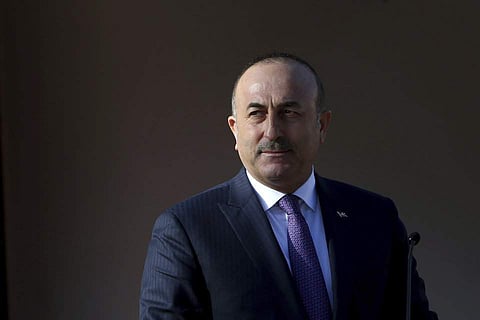

ISTANBUL: Turkey's foreign ministry on Tuesday summoned the Russian and Iranian ambassadors to Ankara after accusing the Syrian regime of stepping up its offensive on key rebel-held areas, according to Turkish diplomatic sources.
The strikes targeted moderate opposition forces in Idlib province near the Turkish border, according to Turkish Foreign Minister Mevlut Cavusoglu, who warned it could torpedo talks aimed at ending the war.
"Regime forces are striking moderate opposition with the pretext of fighting against Al-Nusra (Front)," Cavusoglu was quoted as saying by the official Anadolu news agency, referring to the former Al-Qaeda affiliate.
Idlib province is almost entirely controlled by anti-government forces that are dominated by a jihadist outfit known as Hayat Tahrir al-Sham (HTS) consisting mostly of former Nusra fighters.
"This attitude would scupper the political solution process," Cavusoglu said.
"The parties that will come together in Sochi should refrain from" any action that could threaten the talks, he warned.
Russia is hoping to hold a Syria peace congress in its Black Sea resort of Sochi on January 29-30.
Ankara conveyed "uneasiness" to the Russian and Iranian ambassadors, stating it considered the strikes a "violation of the borders of the Idlib de-escalation zone" established by Turkey, Iran and Russia, according sources at the foreign ministry.
The Russian ambassador was asked to speak to Moscow to tell the Syrian government in Damascus to end the assault, added the sources.
Meanwhile, US-brokered talks based in Geneva between the regime and the opposition are also going forward, albeit at a stuttering pace.
A previous attempt in November to convene talks in Sochi failed due to disagreements between the prospective participants.
Turkey says it will oppose any talks involving the Kurdish militia of the Democratic Union Party (PYD), which Ankara views as a terror group.
In 2016, Ankara and Moscow brokered a fragile ceasefire in certain areas -- which has been bolstered by the negotiations in the Kazakh capital of Astana.
Both Damascus and the rebel factions regularly accuse each other of violating the ceasefire in the de-escalation zones, including in Idlib.
A likely future sticking point between Russia and Turkey is the fate of Syrian President Bachar al-Assad, who Ankara has vehemently opposed throughout the conflict.
Last month, Turkish President Recep Tayyip Erdogan said it was impossible to advance with Assad in power, describing him as a "terrorist".
Syrian regime forces on Monday pounded Idlib as well as the Eastern Ghouta enclave near Damascus, the two last rebel bastions in Syria.